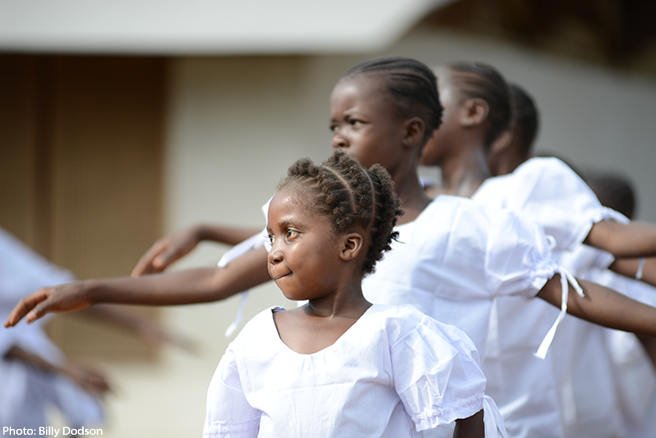Closing the Literacy Gap for Girls

Nkechi’s father had only paid for her brother to take the final exams in primary school, bringing her education to an end after primary 6. Thankfully, when it came time for her own children to progress on from primary school, her husband agreed to pay for their two daughters and their son to take the same exams.
But secondary school was expensive. Nkechi’s husband only made enough to pay for two children to finish secondary school. Luckily, she had learned enough through her primary school education to read her local bank cooperative’s form, sign her name and take a loan. She’d since paid back the loan and saved enough money to pay for her youngest girl to attend secondary school. She was determined that all her children would “finish school.”
***
Though Nkechi is a fictional character, her story outlines a situation familiar to many African families. For many African girls born to uneducated mothers, the chances of going to school are still low. According to a 2013 report by the UN Educational, Scientific and Cultural Organization’s Institute for Statistics, only 70 percent of the youth in sub-Saharan Africa are literate, the lowest of any region in the world. In rural communities, the financial and opportunity costs of formal education, combined with gender bias toward girls, means that primary school is often the best that girls receive. In most rural schools even those six years can be difficult. Many girls are exposed to sexual harassment from male teachers and students, while restroom facilities may provide little or no privacy for the girls. And, at the end of the school day, there are domestic chores waiting for their attention.
Yet studies show that educated women invest more in their family’s well-being and in the education of their children than women who have not had the benefit of schooling. A literate woman is less likely to contract HIV, and her children are more likely to survive past the age of 5. She also earns more wages and has a direct and positive impact on her country’s annual per capita income.
I was raised by two such women, my mother and grandmother. They defined “finishing school” as obtaining a master’s degree in a field of my choice. I am choosing to focus on conservation education. Building the environmental awareness of young people, and instilling in them the confidence that our individual actions can have positive lasting impact, will indeed ensure the long-term sustainable use of natural resources. Lofty? Yes. But in my opinion, this idea that “I can, if I try” is the true meaning of empowerment.
Over and above the 18 years of school that the circumstances of my birth afforded me is the deep abiding sense that anything is within my reach. I learned it from the two women who taught me to change a lightbulb and showed me how to speak up. Some girls learn it as they walk miles to fetch water and work with their mothers on the farm after school. Regardless of its foundations, the idea that “I can” motivates me, and other women across Africa, to seek better opportunities for ourselves, our children and our communities. In light of this year’s AU Summit and the mid-term review of the African Women’s Decade, we have a responsibility to close the literacy gap and improve access to basic education for 28 million African girls. Most of all, it is our responsibility because, as Aisha Laraba Abdullahi, the AU commissioner for political affairs, has noted, “the continent cannot achieve any significant development without significant representation of women and youth.”
The 25th African Union Summit is taking place this week in Johannesburg, South Africa, with the theme, "Year of Women’s Empowerment and Development Towards Africa’s Agenda 2063." Since the 1980’s, women's empowerment has been integrated in every aspect of African development strategies including but not limited to education, business and employment. However, conservation and environment management is the critical area that has not been given the necessary attention for women involvement.
The above blog post is one of a series that underscores the important role of women in conservation matters, and how women every day across Africa are already empowered to make decisions that have critical impact on their own future, the future of their families and the future of Africa’s natural resources. Discover more blogs in this series.